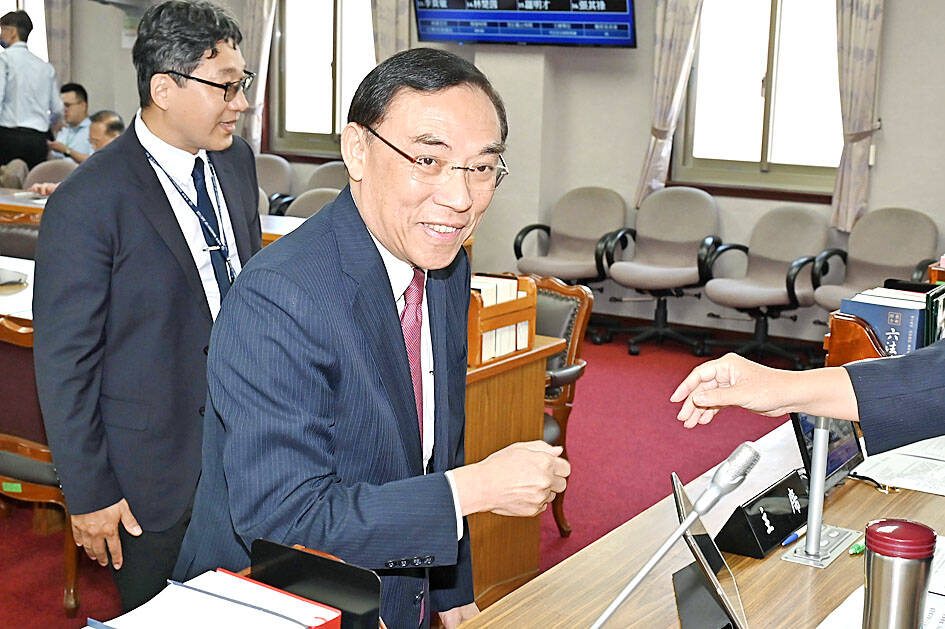The Ministry of Justice Investigation Bureau (MJIB) yesterday said it has seized NT$11.5 billion (US$354.6 million) in illegal remittances, as it warned that foreign actors are using remote funding, Internet betting and cognitive warfare to influence next year’s presidential and legislative elections.
Minister of Justice Tsai Ching-hsiang (蔡清祥) told a meeting of the legislature’s Judiciary and Organic Laws and Statues Committee that the ministry had conducted joint operations with the Taiwan High Prosecutors’ Office from July 3 to July 12 and from Sept. 20 to Sept. 26, targeting underworld banking operators to cut off cash flows funding illicit activities within the nation’s borders.
The ministry detailed how offshore funding is being used, including making donations to candidates via Taiwanese businesspeople, contributing to temple charity events, using dummy accounts to “like” specific candidates’ posts and funneling funds to candidates through unregistered banks or cryptocurrency.

Photo: Tu Chien-jung, Taipei Times
The MJIB is also to step up efforts to monitor Chinese coming to Taiwan on the pretext of “social interaction,” but who might be involved in attempts to influence the Jan. 13 elections or to conduct illegal activities, Tsai said.
When appropriate or necessary, it would launch investigations against individuals to deter foreign actors from using offshore funding to influence Taiwan’s political and financial activities, he added.
Separately, National Security Bureau (NSB) Deputy Director-General Hsu Hsi-hsiang (徐錫祥) yesterday said that the bureau is prepared to combat the use of deepfake technology by foreign actors to influence the elections.
The NSB has initiated a special project that incorporates other national security agencies to help affected ministries or agencies in issuing news releases to clarify the government’s stance and policies, Hsu said.
In addition, it is to train about 220 people to safeguard the presidential and vice presidential candidates, it said.
The teams would be assigned to the candidates once the registration process officially concludes on Nov. 24.
The NSB said it has included in its budget 220 bulletproof vests this year, along with 12 custom-made bulletproof vests and briefcases for the candidates and their running mates.
On Wednesday, the Central Election Commission (CEC) gave a demonstration of operations on the day of the elections, emphasizing the importance of polling station workers being able to handle emergencies.
The demonstration in Tainan covered the process for verifying a voter’s identity and casting ballots, as well as vote counting and how to respond in certain scenarios, such as a fire or the discovery of a suspicious package.
The ability of polling station workers to deal with unexpected situations is particularly important given the increasing competitiveness of election campaigns, CEC Chairperson Lee Chin-yung (李進勇) told city and county officials attending the demonstration.
The spread of false information and attacks from hostile foreign forces also mean that polling station workers need to strictly adhere to laws and regulations to avoid potential disputes, Lee said.
Local police also took part in Wednesday’s demonstration showing how to handle a range of situations, including individuals breaking the law by taking photographs or video recording voters within 30m of a polling station or leaving threatening notes in the station.
Additional reporting by CNA

A car bomb killed a senior Russian general in southern Moscow yesterday morning, the latest high-profile army figure to be blown up in a blast that came just hours after Russian and Ukrainian delegates held separate talks in Miami on a plan to end the war. Kyiv has not commented on the incident, but Russian investigators said they were probing whether the blast was “linked” to “Ukrainian special forces.” The attack was similar to other assassinations of generals and pro-war figures that have either been claimed, or are widely believed to have been orchestrated, by Ukraine. Russian Lieutenant General Fanil Sarvarov, 56, head

SAFETY FIRST: Double the number of police were deployed at the Taipei Marathon, while other cities released plans to bolster public event safety Authorities across Taiwan have stepped up security measures ahead of Christmas and New Year events, following a knife and smoke bomb attack in Taipei on Friday that left four people dead and 11 injured. In a bid to prevent potential copycat incidents, police deployments have been expanded for large gatherings, transport hubs, and other crowded public spaces, according to official statements from police and city authorities. Taipei Mayor Chiang Wan-an (蔣萬安) said the city has “comprehensively raised security readiness” in crowded areas, increased police deployments with armed officers, and intensified patrols during weekends and nighttime hours. For large-scale events, security checkpoints and explosives

PUBLIC SAFETY: The premier said that security would be tightened in transport hubs, while President Lai commended the public for their bravery The government is to deploy more police, including rapid response units, in crowded public areas to ensure a swift response to any threats, President William Lai (賴清德) said yesterday after a knife attack killed three people and injured 11 in Taipei the previous day. Lai made the remarks following a briefing by the National Police Agency on the progress of the investigation, saying that the attack underscored the importance of cooperation in public security between the central and local governments. The attack unfolded in the early evening on Friday around Taipei Main Station’s M7 exit and later near the Taipei MRT’s Zhongshan

REBUFFED: In response to Chinese criticism over recent arms sales, Washington urged Beijing to engage in meaningful dialogue instead of threats and intimidation Washington’s long-term commitment to Taiwan would not change, the US Department of State said yesterday, urging Beijing to stop pressuring Taiwan and engage in meaningful bilateral dialogues. The remarks came in response to a backlash from Beijing about Washington’s latest approval of arms sales to Taiwan. The US Defense Security Cooperation Agency said in a statement on Wednesday that the Taipei Economic and Cultural Representative Office in the US has asked to purchase an arms package, including Tactical Mission Network Software; AH-1W helicopter spare and repair parts; M109A7 self-propelled howitzers; HIMARS long range precision strike systems; tube-launched, optically tracked, wire-guided missiles; Javelin